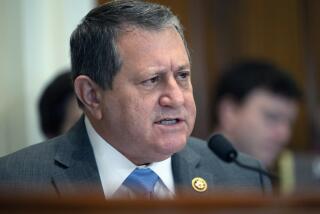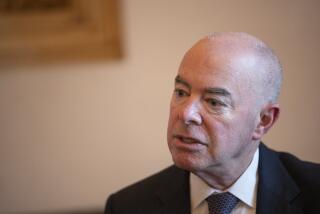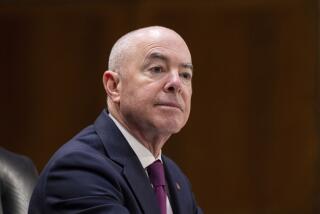Sen. Feingold will try anew to censure Bush
- Share via
WASHINGTON — One of the Senate’s most liberal members said Sunday that he would “shortly” propose two censure resolutions against President Bush and his administration for the war in Iraq, even as the top Democratic and Republican leaders in the Senate promptly predicted that the effort would fail.
Sen. Russell D. Feingold (D-Wis.), who last year tried unsuccessfully to censure Bush over the administration’s warrantless wiretap program, said he would introduce the resolutions “in a few days.”
According to a statement from Feingold’s office, one resolution will be aimed specifically at Bush and Vice President Dick Cheney for “misconduct related to the war in Iraq” such as “overstating” Saddam Hussein’s possession of weapons of mass destruction, “failing to plan for the civil conflict and humanitarian problems,” and “justifying our military involvement in Iraq by repeatedly distorting the situation on the ground there.”
The second censure resolution will “focus on the administration’s attack on the rule of law” with respect to the warrantless wiretap program; policies on torture and on the detainees at Guantanamo Bay, Cuba; and the dismissal of several U.S. attorneys last year. Atty. Gen. Alberto R. Gonzales will be among those cited in the second resolution, Feingold said Sunday.
“This administration has assaulted the Constitution,” Feingold told NBC’s “Meet the Press.” “We need to have on the historical record some kind of indication that what has happened here is ... disastrous.”
He called Cheney “one of the worst actors in American history” and added: “There may be others. On the rule-of-law issue, on the attack on the Constitution, the current attorney general has had one of the worst records of not being honest ... of being intentionally misleading.”
Feingold acknowledged that there would be no legal consequence to Bush and his administration if the resolutions were to pass, but he nonetheless said that “the buck stops with the president. That is the No. 1.”
A White House spokesman, Trey Bohn, responded to Feingold’s comments by saying the Democratic-led Congress should be concentrating less on politically driven issues and more on such topics as U.S. troop funding, healthcare and tax relief.
“We realize that Sen. Feingold does not care much for the president’s policies,” Bohn said. “Perhaps after calls for censure and more investigations, Congress may turn to such things.”
Even the leader of Feingold’s party in the Senate, Majority Leader Harry Reid of Nevada, predicted that the proposals would not pass. He said Republicans would not allow such a vote and, in any case, “we have so many other things to do.”
“The president already has the mark of the American people that he’s the worst president we’ve ever had,” Reid said on CBS’ “Face the Nation.” “I don’t think we need a censure resolution in the Senate to prove that.”
On the GOP side, Senate Minority Leader Mitch McConnell of Kentucky dismissed Feingold’s proposal as “right in league with the all-night session the other night, which the American people are looking at with disbelief.” In a marathon session last week, Senate Democrats came up short on a resolution to force Bush to commit to a U.S. troop withdrawal from Iraq.
“I think it’s safe to say Russ Feingold is not a fan of George Bush,” McConnell said on CNN’s “Late Edition.” “I think that’s the best way to sum that up.”
Of Democrats’ leadership since taking control of Congress in January, McConnell said: “This Congress now has a 14% approval rating. We think it’s the lowest in the history of polling.
“All they do is have Iraq votes and investigations.”
Coming to Feingold’s defense on CNN was the No. 2 Democrat in the Senate, Richard J. Durbin of Illinois. “This administration has gone far beyond the exercise of political power,” he said. “They have abused the Constitution in some respects. And I think it’s appropriate for us to take the censure resolution up.
“It is short of impeachment, but it’s an important debate.”
More to Read
Get the L.A. Times Politics newsletter
Deeply reported insights into legislation, politics and policy from Sacramento, Washington and beyond. In your inbox twice per week.
You may occasionally receive promotional content from the Los Angeles Times.











